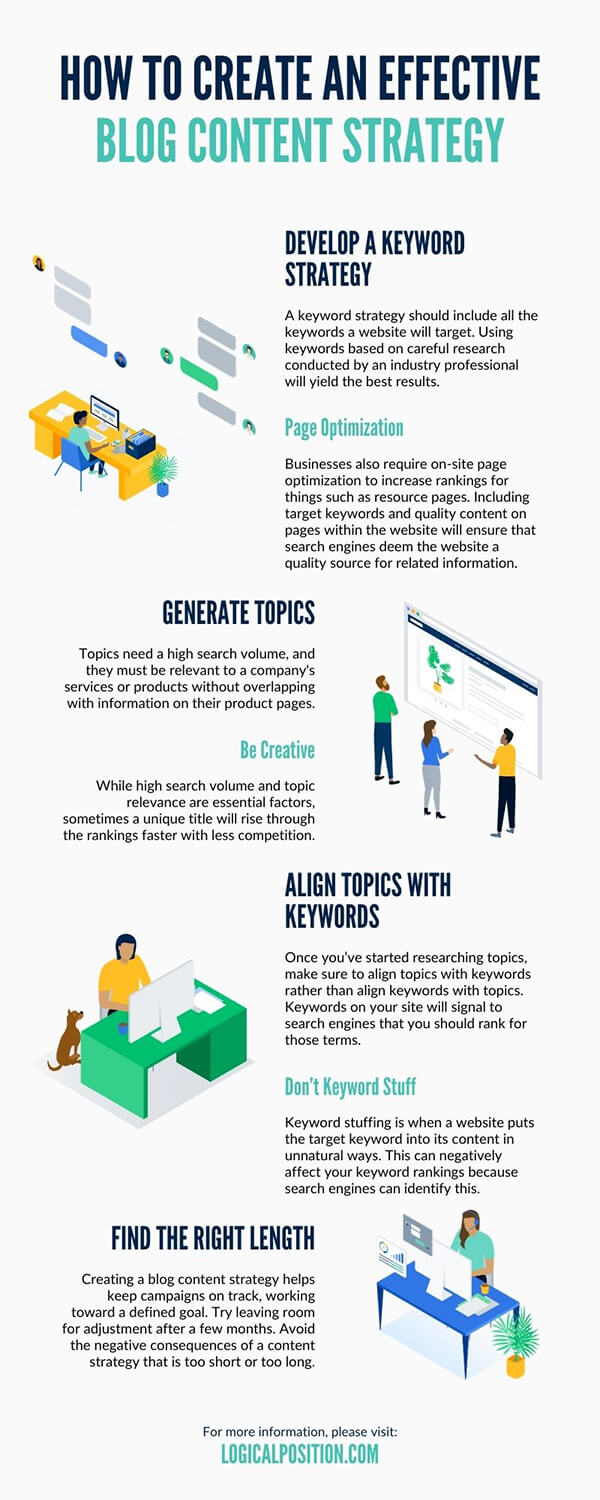Blogging is an effective method for adding fresh, informational content to a website. Regularly updated blogs that contain relevant, helpful content can play a major role in the organic rankings on popular search engines such as Google.
Organic rankings are one of the longer-term digital marketing methods that can increase a website’s online visibility. It requires constant upkeep and campaign adjustments. Blogging is how many companies keep their websites consistently pertinent for users and search engines. A content strategy is like a map that helps plan content topics, keyword usage, and quality over time. A blog is only as good as its content strategy. They outline the content written on a site and connect it to keywords based on keyword research, search volume, and result relevancy. Explore how to create an effective blog content strategy for your search engine optimization campaign by reading ahead.
Develop a Keyword Strategy
When setting out to create an effective content strategy, the first step is to develop a solidified keyword strategy. A keyword strategy should include all the keywords a website will target. Using keywords based on careful research conducted by an industry professional will yield the best results.
Keyword Research
Keyword research is an involved process requiring patience and careful adjustments. Below are some key elements:
- Checking for search volume
- Looking up featured snippets and other specialized results
- Tracking search volume changes over time
- Exploring the attainability of the keywords
A great amount of research goes into choosing keywords for a company. They must be relevant to the business’s products or services, as well as the company’s location or service area. They should also account for the way people search on the internet, and much more.
Page Optimization
While blogging is essential to SEO, it isn’t enough to deliver results. Businesses also require on-site page optimization to increase rankings for things such as resource pages.
Including target keywords and quality content on pages within the website will ensure that search engines deem the website a quality source for related information.
Generate Topics
Topic generation sounds easy, but can be one of the most difficult factors in an SEO campaign. Topics need a high search volume, and they must be relevant to a company’s services or products without overlapping with information on their product pages.
Consider Questions Your Customers Ask
To start on topic generation, think about the questions your customers ask. When customers take the time to reach out and ask a question, chances are, other people are wondering about the same thing. A blog about the topic may be useful and even cut down on confusion.
As an example, consider a company that sells various sweaters online. Customers may reach out and ask about the difference between a wool sweater and one made of cotton. Professional research can help develop a blog title that answers that question and has relevant search results such as “The Benefits of a Wool Sweater” or “Tips for Caring for a Cotton Sweater.” These are topics that contain beneficial information to consumers interested in the company’s products without focusing specifically on the sweaters the business sells.
Find Out What Competitors Are Doing
You can also look at competitor websites. Most businesses have a blog, and companies can look at their competitors’ websites to get ideas for blogs they should write. Remember that looking for inspiration from competitors and copying them are two vastly different things. Companies should only post original content to their websites.
Be Creative
Creativity is vital when it comes to topic generation. While high search volume and topic relevance are essential factors, sometimes a unique title will rise through the rankings faster with less competition. Don’t be afraid to get creative and make your own titles, then cross-reference their statistics to determine their functionality within your outlined goals.
Align Topics With Keywords
Once you’ve started researching topics, make sure to align topics with keywords rather than align keywords with topics. Keywords on your site will signal to search engines that you should rank for those terms.
Make Topics for Keywords
It’s much more efficient to develop keywords first and then curate topics that align with those keywords.
Don’t Keyword Stuff
Keyword stuffing is when a website puts the target keyword into its content in unnatural ways. Sometimes, the keyword will pop up much too often. This can negatively affect your keyword rankings because search engines can identify this.
Find the Right Length
Creating a blog content strategy helps keep campaigns on track, working toward a defined goal. Try leaving room for adjustment after a few months. Avoid the negative consequences of a content strategy that is too short or too long.
What Happens When a Strategy Is Too Short
When a strategy doesn’t cover a long enough period, the company may run out of topics before giving the keywords a chance to be indexed by Google. Sites aren’t indexed every day, and it can take a few months for keyword ranking to start showing movement. With a three-month content strategy, it can be easy to panic that keywords aren’t moving yet when this is entirely normal and nothing to worry about.
What Happens When a Strategy Is Too Long
When a strategy is too long, the company may not set milestones and track growth at the right times. While three months isn’t usually enough time to show growth, a year might be too long, depending on the company. Leave room for changes and adjustments to the campaign goals; otherwise, half of the strategy may need to be thrown out.
Try to hit a happy medium in strategy length that gives your keywords time to rank without neglecting any changes that could occur in the future.

There are many benefits to blogging on a company website. Blogs provide relevant content that informs search engines and users alike that your site is well-managed and focuses on a positive user experience. Blogs that provide pertinent information about products and services can significantly increase the site’s keyword rankings over time. However, blog writing, creating compelling visuals, and subtle keyword inclusion is difficult for many businesses.
Logical Position offers professional search engine optimization services for local and national businesses. Our services include a dedicated team of professionals. This team comprises in-house graphic designers who create infographics, content writers who write specialized blogs, analysts who select target keywords, account managers who involve clients in every step of the SEO process, and many others integral to the SEO growth of a website.




